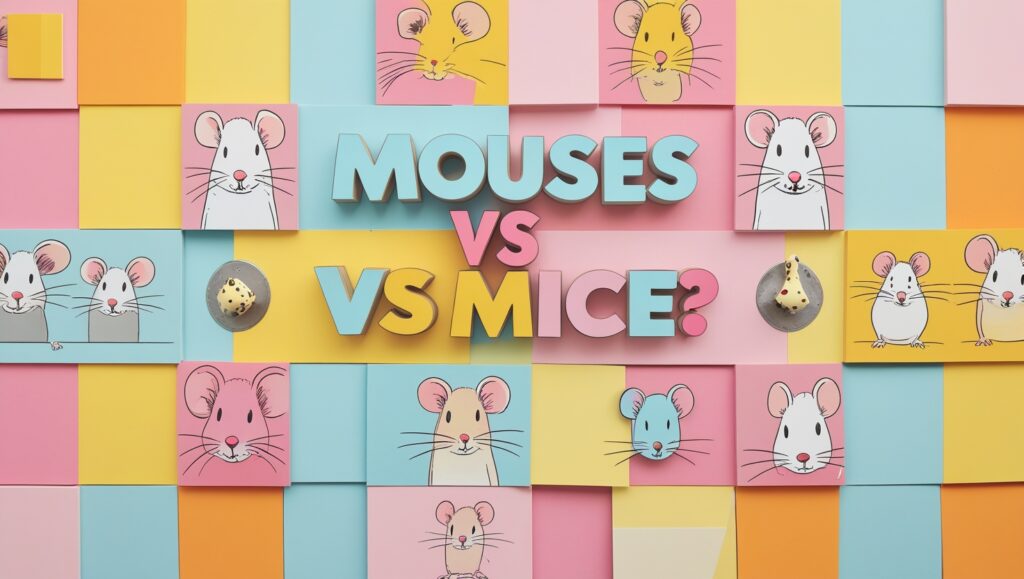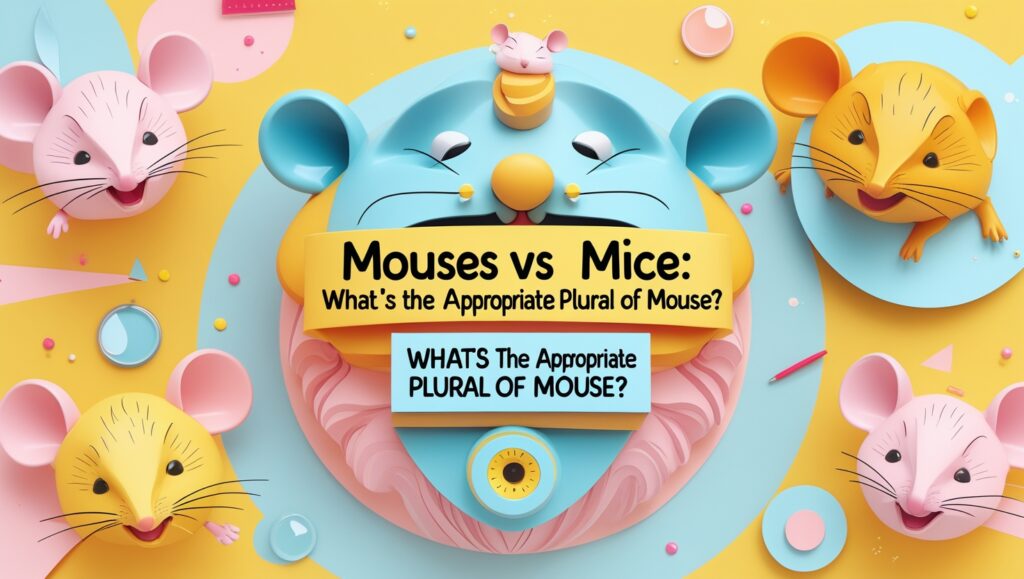The English language loves to break its own rules. One perfect example? The plural form of the word mouse. If you’ve ever hesitated between saying “mouses vs mice,” you’re not alone. It’s a surprisingly common grammar trap—even for native speakers. So, what’s the correct plural of mouse? As with many things in English, the answer depends on context.
In this detailed guide, you’ll learn when to use mouses and when to use mice, discover the origin of the word mouse, explore examples, grammar rules, and much more. Whether you’re a language lover, an ESL learner, or just curious, this guide covers it all.
Quick Summary
The debate over mouses vs mice boils down to context. When referring to rodents, the correct plural of mouse is mice, following traditional irregular plural rules in English. However, in the world of technology, where a mouse refers to a computer device, the plural can be mouses—a form that’s widely accepted by professionals and even listed in modern dictionaries. Use mice for animals and mouses for tech tools to stay grammatically accurate. Whether you’re writing a research paper or ordering office supplies, knowing the correct plural of mouse ensures clarity and professionalism.
Why This Confuses Even Native English Speakers

The confusion stems from the fact that “mouse” has two dominant meanings:
- A small rodent, typically found in the wild or as a pet.
- A computer device, used for navigation and control.
These two definitions lead to different plural forms depending on the context. That’s where the debate of mouses vs mice begins. But to understand it fully, we must break down what the word means in both worlds.
Definitions: What Does “Mouse” Actually Mean?
Animal Context – Small Rodent
In biological terms, a mouse is a small, furry mammal of the rodent family. They’re often found in fields, homes, and laboratories. These creatures are known for their long tails, sharp teeth, and high reproductive rates.
Tech Context – Computer Device
In computing, a mouse is a handheld device that controls the cursor on a computer screen. It was invented in the 1960s and became popular in the 1980s with the rise of graphical interfaces. It’s now an essential input device in most modern workspaces.
So, does the mouse plural form depend on whether you’re talking about animals or machines? Yes. Absolutely.
Plural of ‘Mouse’ in Different Contexts
When you talk about the plural of mouse, you must consider the context. Here’s how it breaks down:
| Context | Singular | Plural | Correct Usage? |
|---|---|---|---|
| Animal | Mouse | Mice | ✓ (Standard) |
| Computer Device | Mouse | Mouses | ✓ (Tech Industry) |
- “Mice” is correct when referring to animals.
- “Mouses” is an accepted term in the technology world when referring to multiple computer devices.
Interesting Fact:
Merriam-Webster and Oxford Dictionaries now list mouses as a valid plural form only when referring to computer hardware.
When to Use “Mouses” and When to Use “Mice”
Understanding usage comes down to your audience and your subject.
Use Mice When:
- Referring to multiple rodents: “The field was full of mice.”
- Writing in academic, biological, or general prose.
Use Mouses When:
- Talking about more than one computer device: “We connected five mouses to the setup.”
- Writing in IT manuals, tech blogs, or corporate hardware documentation.
- Differentiating between animals and devices in mixed usage: “The lab had three mice and two mouses.”
Professional Writing Tip: In formal documentation, some writers prefer using “mouse devices” to avoid the plural confusion altogether.
Word Origin and Etymology of “Mouse”
To understand why the plural of mouse is mice, we need to look at the word’s roots.
- Old English: mūs (singular), mūse (plural)
- Proto-Germanic: mūs
- Proto-Indo-European: mūs — meaning “stealer” (possibly because mice steal grain)
Mice is an irregular plural, formed much like geese, teeth, and men. The pattern follows old grammar systems from centuries ago. These forms have persisted due to frequent usage in speech and literature.
Mouses in Tech: Is It Official or Just Industry Slang?

At first, the tech community struggled with what to call multiple computer mice. Early documentation even used “mouse devices” as a workaround. Over time, “mouses” became the accepted plural form in the tech world.
Quotes from Industry
- “The plural of a computer mouse is mouses.” — Microsoft Manual of Style
- “Some writers prefer ‘mouse devices’ to avoid confusion.” — Chicago Manual of Style
Example From Brands
- Apple and Logitech often use “mouses” in product descriptions and support documentation.
So yes, in the world of computers, mouses is grammatically acceptable and widely used.
Mouse vs Rat: Quick Comparison
Although some use these terms interchangeably, they refer to different animals. Here’s a clear comparison:
| Feature | Mouse | Rat |
|---|---|---|
| Size | Small (2–4 inches) | Larger (7–9 inches) |
| Tail | Long and thin | Thicker and scaly |
| Ears | Large compared to head | Smaller proportionally |
| Behavior | Curious, social | Aggressive, cautious |
| Habitat | Homes, fields, forests | Sewers, warehouses, cities |
Understanding the difference between rat and mouse is key in pest control, pet ownership, and scientific studies.
Examples of Proper Usage in Sentences
Mouse (Singular)
I bought a new mouse for my laptop.
A small mouse ran under the cupboard.
Mice (Plural – Animal)
The attic was infested with mice.
Scientists observed how mice reacted to the stimulus.
Mouses (Plural – Device)
The tech team tested several wireless mouses for responsiveness.
We stocked up on ergonomic mouses for the new office.
Grammar Rules Behind Irregular Plurals
English has several irregular plurals, and the mouse ka plural follows that pattern.
Common Irregular Plurals:
- Goose → Geese
- Tooth → Teeth
- Man → Men
- Louse → Lice
- Child → Children
These forms often derive from Old English or Germanic languages, which had complex pluralization rules. As English evolved, some of these stuck around—especially for frequently used words.
Explore further:
- Cacoon or Cocoon: Which Spelling is Correct?
- Past Tense of Swing? Is It Swing, Swang, or Swung?
- Re-sign Vs Resign? Understand the Proper Usage of Each
- Compare and Contrast: Definitions, Differences, and Examples
- Afterward or Afterwards: Is There Any Difference?
Visual Aid: Plural of Mouse at a Glance
| Context | Singular | Plural | Example Sentence |
|---|---|---|---|
| Animal | Mouse | Mice | The field was swarming with mice. |
| Computer Device | Mouse | Mouses | We connected two mouses to the PC. |
| General Unknown Use | Mouse | Mice | “Mice” is a safer default if unsure. |
Final Verdict: So… Is It “Mouses” or “Mice”?
It depends:
- If you’re talking about rodents, always use mice.
- If you’re talking about computer devices, mouses is technically correct and widely accepted in professional and tech settings.
When in doubt, consider your audience. Casual readers may expect “mice” in all cases, but industry professionals understand and accept “mouses.”
Quiz: Test Your Mouse Grammar IQ
Choose the correct plural:
- There are three __ in the storage room.
a) mouses
b) mice
Answer: b) mice - We bought five new wireless __ for our office.
a) mice
b) mouses
Answer: b) mouses - The __ ran across the lab floor.
a) mouse
b) mice
Answer: b) mice - He plugged in two gaming __ to test latency.
a) mouses
b) mice
Answer: a) mouses
Conclusion
The battle between mouses vs mice is a perfect example of how language evolves alongside technology. When it comes to animals, stick with mice—it’s the traditional, universally accepted form. But when you’re talking about computers, mouses is more than just jargon—it’s a practical, accepted term in modern usage.
Understanding the difference between mouses vs mice gives you an edge in writing, tech communication, and even daily conversation. So next time you’re stocking up on gadgets or watching rodents scurry, you’ll know exactly which word to use.
FAQs
- Is the plural of mouse “mice” or “mouses”?
Both are correct, depending on the context. Use “mice” for animals and “mouses” for computer devices.
- What is the plural of mouse in the Oxford Dictionary?
Oxford lists “mice” as the traditional plural and notes “mouses” as acceptable for the computer device context.
- Why do people say “mouses” when talking about computers?
Because “mice” refers to rodents, “mouses” emerged to avoid confusion in the tech world. It’s now a recognized term.
- Can I say “a mouse is running” if it’s a rodent?
Absolutely. That’s correct grammar. The plural would be “mice are running.”
- Is it two fish or two fishes?
Both are correct: - “Fish” for multiple fish of the same species.
- “Fishes” for multiple species of fish.

Lisa Morris is a seasoned blogger and language enthusiast with a passion for making grammar simple and engaging. At Grammar Scoop, she shares clear, concise tips that help readers master the rules of English with confidence.






